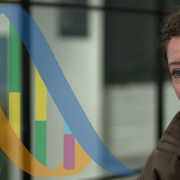Career tips for clinical geneticists: a conversation with Dr Alex Murray and Dr Rhian Thomas
GTAC clinical genetics professional lead Dr Alex Murray and education specialist Dr Rhian Thomas offer advice for early-career practitioners
Are you starting a role in clinical genetics or wondering what it is like to practise in this field? Dr Murray and Dr Thomas recently gave an insightful interview based on their own experiences.
Q: Could you please tell us about your professional background?
Dr Murray: I am a consultant clinical geneticist with a background in adult medicine. My sub-specialty area is cancer genetics. I have a Master’s in medical education, and for 18 years I’ve been a member of the Royal College of Physicians’ specialist advisory committee that oversees education and training for clinical genetics registrars. I joined the committee when I became the training programme director for my centre in Wales in 2006, and I have worked as the recruitment lead, vice-chair and eventually the chair. I am also the clinical director of the All Wales Medical Genomics Service.
Dr Thomas: I earned a BSc in medical genetics, trained in paediatrics and eventually became a clinical genetics registrar in 2019. I then worked with Professor Kate Tatton-Brown at St George’s, where we developed the national registrar teaching programme in 2020. I later moved to the Genomics Education Programme to work on GeNotes and other projects, including the Genomics Training Academy (GTAC). I am also on the specialist advisory committee and have been a trainee representative since 2022. I am due to finish my Master’s in medical education this year.
Q: What advice do you have for newer professionals in your field?
Dr Murray: It’s important to have something in your career that you love to do. There are many demands and pressures, so find things that feed your soul. For me, that’s education. I have been fortunate to watch many of my consultant colleagues progress from the very beginning stages of their genetics careers to becoming consultants. It is so rewarding to be able to support people on their career journeys.
Another piece of advice: try not to over-commit. I know this is difficult. As you progress through your career, you inevitably take on more responsibilities. It is challenging to say no to things, but you need to work hard to maintain your work-life balance (do as I say, not as I do!).
Dr Thomas: For anyone interested in education, I recommend considering all the course options that could equip you for the career that you want. Take opportunities for collaboration in your early career. For example, when I was in F1 and F2, I found many mentorship schemes and ways to collaborate with others. While you are training, keep thinking about what you want your future learners to take from the education. I’ve joined a group of clinicians who are teaching in different ways on the job and in the classroom, which has strengthened my commitment to education and the quality of my delivery. I don’t think I really understood that going into it, but I feel that I’ve really benefitted from it now.
Dr Murray: I agree with Rhian on the importance of collaboration – it is helpful to work in interdisciplinary settings and interact with other specialities, rather than being isolated. Making connections outside of genetics will keep you grounded. With the mainstreaming of genomics, we are increasingly interacting with other specialties.
Q: What has been a highlight with the Genomics Training Academy (GTAC) so far, and what do you look forward to in the future?
Dr Murray: The highlight for me is working with likeminded people who are committed to the same goal of supporting and training the specialist workforce to deliver excellent care for patients. It’s the reason we all went into this in the first place. The GTAC team members are genuinely committed to training and education. We want to bring educational rigour to it, not just provide a teaching session to tick a box. It’s also great that we can look at sharing resources across professions.
Dr Thomas: One lovely thing that came out of the pandemic was that, after setting up the registrar teaching, the national network of registrars feels much closer now. The teaching brought everyone together every couple weeks, prompting the formation of informal/study groups. I look forward to the GTAC making connections like this even stronger and forming different networks for people with similar work. Especially with its hybrid training, I think the GTAC will support this.
- What is the Genomics Training Academy? Learn more about the GTAC here









